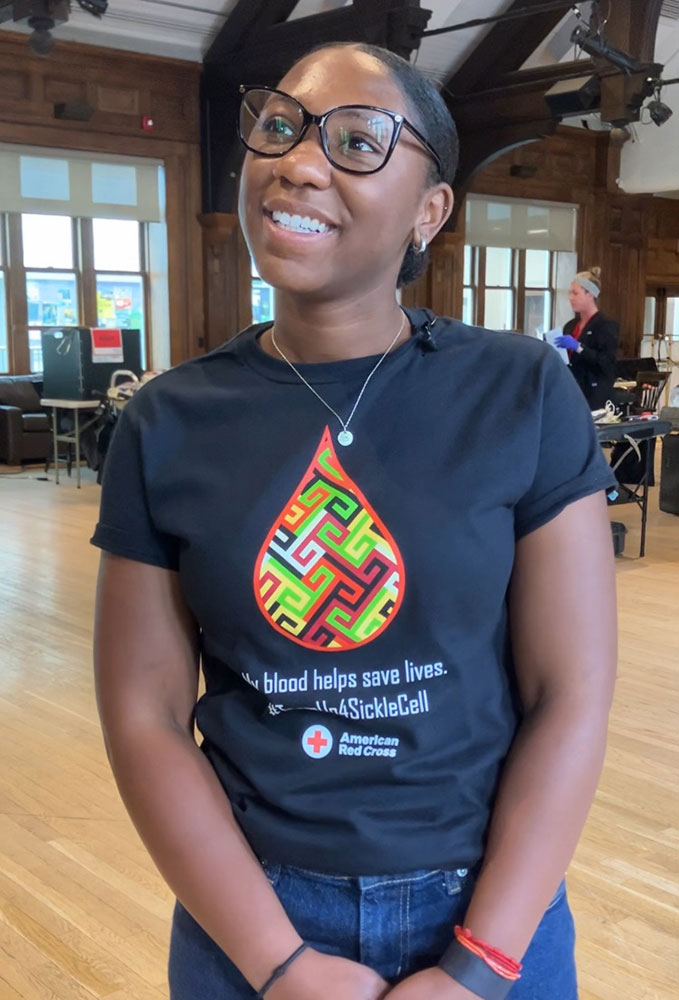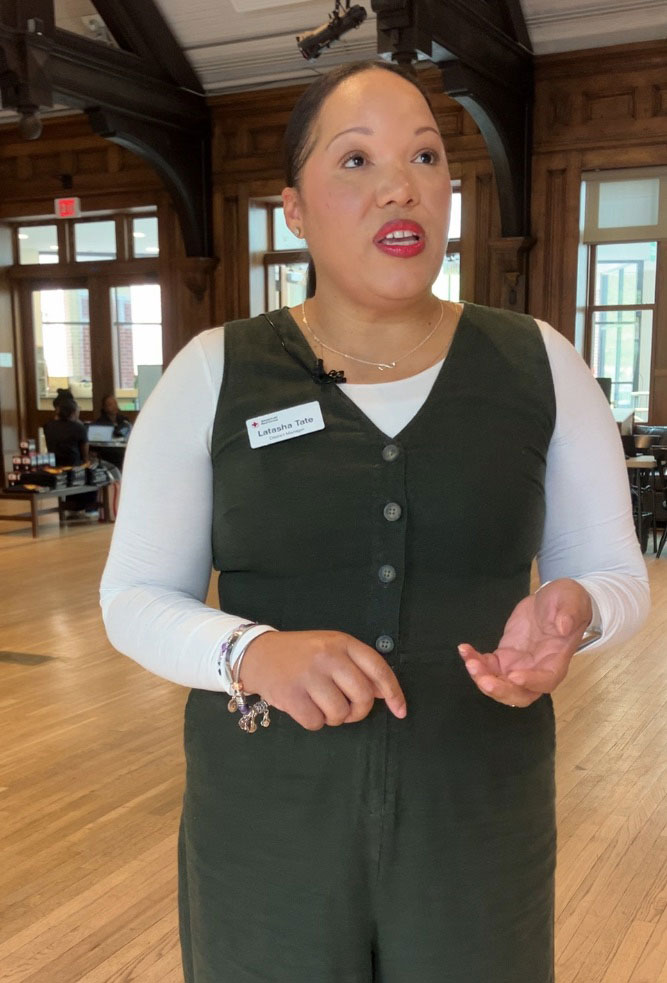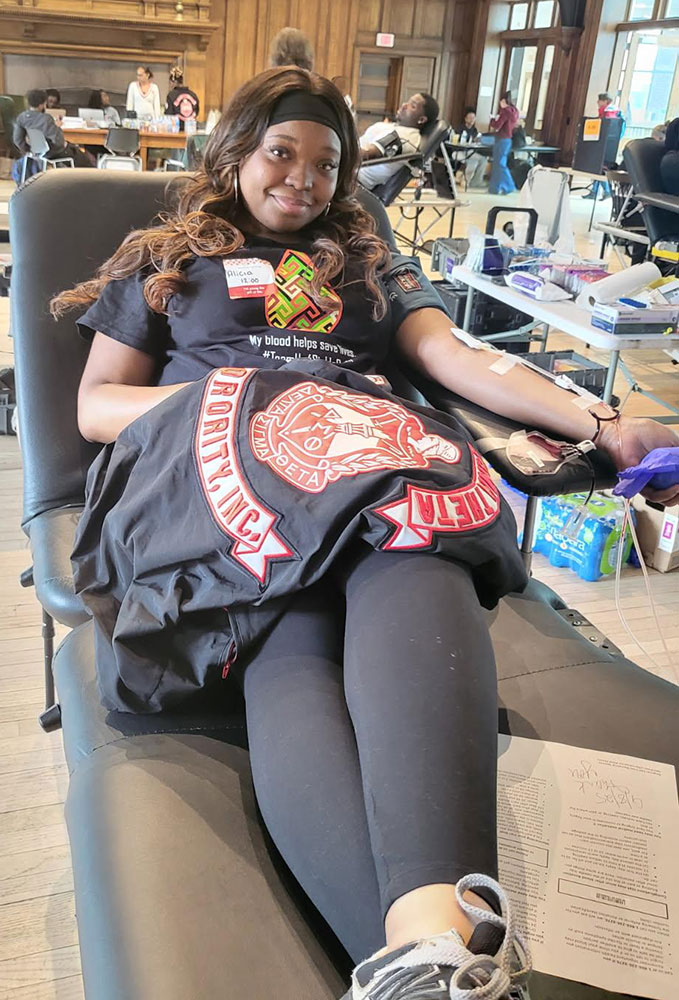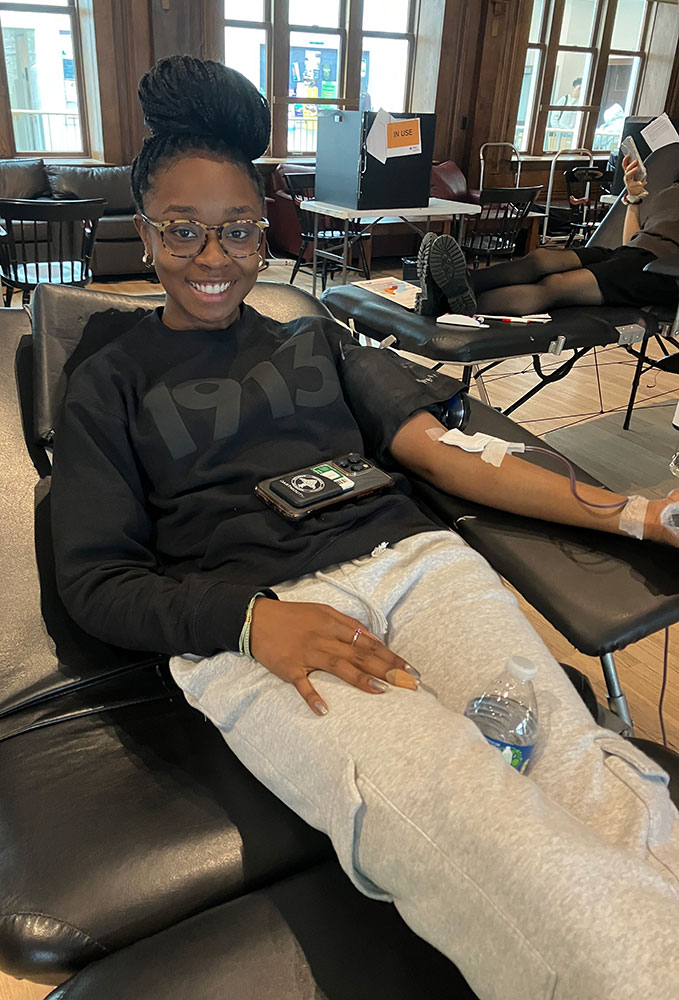
By Peter de Paolo, Red Cross writer
“Sickle cell awareness is very important to the Black community, and we want our fellow students to be educated, not only about the disease, but also about the need for blood donations for patients who have it.”

Maya Bryson is president of Pi Theta Chapter of Delta Sigma Theta sorority at Dartmouth College in Hanover, New Hampshire. She and her sorority sisters teamed up with the American Red Cross to host a campus blood drive aimed at collecting donations from diverse donors, especially those identifying as Black or African American.
Sickle cell disease is the most common genetically inherited blood disorder in the U.S. It affects an estimated 100,000 people, most of whom are of Black or African American descent. The disease affects red blood cells, making them misshapen and hard, and keeping them from delivering oxygen throughout the body.
If you have sickle cell disease at birth, it has to be managed throughout your life, and if left untreated, it can damage vital organs. There are other treatment options, from medication to bone marrow transplants and gene therapy, but blood transfusion remains a common treatment for many. A single patient with sickle cell disease can require multiple blood transfusions each year to treat complications from sickle cell disease. Some may need as many as 100 units per year.

“An event, like this, brings young college students with a big voice to campus where they can make a direct impact on people who look like us in our community not only by learning about the ways their blood is making an impact, but the way that they can continue to spread messages like this beyond campus,” says Kourtney Bobb, another Delta Sigma Theta member.
Many sickle cell patients need multiple blood transfusions each year to replenish their supply of healthy red blood cells, and a good match of blood type is critical for a transfusion to be effective. The most compatible blood match comes from a donor of the same race or similar ethnicity. Currently, the Red Cross has an urgent need for blood for sickle cell patients.
“We serve diverse patients, and we want our blood supply to match the needs of those patients,” explains LaTasha Tate, Red Cross District Manager for New Hampshire and Vermont. “Minority donors play a vital role in our ability to provide good matches for all those needing blood.”

Latasha Tate
Red Cross District Manager
Safe blood transfusions depend on careful blood typing and matching. The Red Cross tests and types all donated blood to find the best match for each patient.
Blood types are inherited, much like eye color. You may be familiar with the A, B, O and AB blood types. That’s only the beginning. There are over 600 known antigens, proteins in your red blood cells, that determine blood type. Some blood types are more commonly found in donations from blood donors who are Black, including those negative for C, E, and K antigens. C-, E-, K- blood is the most requested blood type for a patient with sickle cell disease.
The day of Dartmouth’s sickle cell drive, many of the members of Delta Sigma Theta stepped up to give blood themselves. For Bobb, a graduate student in Public Health, it wasn’t the first time. For her, blood donation is a no brainer.
“It’s just an easy way I can do my part, and I understand the importance of what my donation can do for someone else, especially someone who looks like me,” she says. “We can all contribute to our community just by educating ourselves about this disease, but blood donation is a great way to make a tangible impact.”

Sorority member, Alicia Cage, a rising senior from Atlanta, was giving blood for the first time at the drive, a “power red” donation that provides twice the number of red blood cells as a whole blood donation.
“This blood drive aligns with our chapter’s mission to help fill the gap between the number of people who have this disease and the supply of blood donations they need on a regular basis” she says.
Cage’s younger sister has the sickle cell trait. That means she doesn’t have the disease but could have a child who might be afflicted if the other parent also has the trait.
“It’s something we’ve talked about as a family,” Cage says. “As she’s growing older, we want her to understand what having the sickle cell trait might mean if she has kids.”
It is estimated that in the U.S. 1 in 13 Black and African American babies are born with sickle cell trait, according to the Centers for Disease Control and Prevention. Testing for this genetic condition in the U.S. is routinely done at birth, with a small blood sample taken from the baby’s finger or foot but testing only became widely practiced in 2006.
Launched in 2021, the Red Cross Sickle Cell Initiative has provided over 260,000 sickle cell trait screenings for first time Black and African American donors. Survey results from these donors reveal that more than 40 percent of those who screened positive for the genetic marker were unaware that they had it.

As Tate explains, “When you come in to donate, we ask you to identify your race. If you identify as Black, African American, or mixed race, our lab tests for sickle cell trait, and you’re notified whether you carry it through the Red Cross app. Your donation can then be matched to a suitable recipient.”
And in addition to the blood donations needed to replenish red blood cells for sickle cell patients, carefully matched blood and platelet donations are also needed for patients undergoing stem cell replacement and gene therapy for the disease to avoid complications during their treatments.
Sickle cell disease can be debilitating for some, more of a nuisance for others, but through the efforts of the Red Cross and community-minded groups like the women of Delta Sigma Theta, more people are learning about not only the importance of Black and African American blood donation for patients with the disease, but also about the simple blood test that can lead to its prevention.
Right now, there aren’t enough blood donors to meet the urgent need for blood for patients with sickle cell disease. Act today! Schedule an appointment to give by visiting RedCrossBlood.org, using the Red Cross Blood Donor app, calling 1-800-RED CROSS (1-800-733-2767), or by enabling the Blood Donor Skill on any Alexa Echo.
Support all the urgent humanitarian needs of the American Red Cross.
Find a drive and schedule a blood donation appointment today.
Your time and talent can make a real difference in people’s lives. Discover the role that's right for you and join us today!